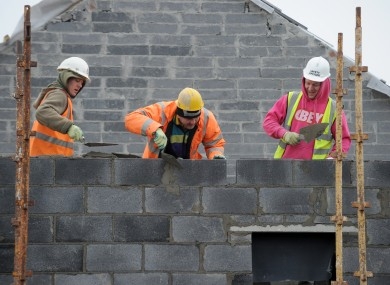Ireland: Ireland's construction activity increased for the third successive month
2013/12/10

Ireland's construction activity increased for the third successive month in November, albeit at a slower pace, helped by further development in new order increase.
The Ulster Bank Construction Purchasing Managers' Index (PMI) slid to 58.8 from 59.4 in October, Markit Economics said Monday. A PMI score above 50 indicates increase in the sector.
New orders rose for the fifth month in a row and the sharpest rate since October 2006. Stronger request was seen both from the domestic market inclunding from abroad. As a result, the rate of job creation strengthened significantly, following two months of marginal increase.
Purchasing activity increased for a third month and business sentiment was the highest since the survey began in June 2000.
"In keeping with the pattern of the last several months, the improvements are being underpinned by recoveries in both the Housing and Commercial arenas where activity has presently increased in each of the completed five and four months respectively," Simon Barry, chief economist at Ulster Bank, said.
"Near-term prospects for the sector appear favorable, judging by a further acceleration in the rate of increase of new business."
However, Barry pointed out that activity levels in the Irish construction sector remain extremely low following the 2007-13 crash. Hence, the recent improvements in construction activity and confidence need to be seen in the context of the huge declines of recent years, the economist added.
- Related Articles
-
Global growth will be disappointing in 2016: IMF's Lagarde
2016/01/02 World economic increase will be disappointing next year and the outlook for the medium-term has as well deteriorated, the chief of the International Monetary Fund said in a guest article for German newspaper Handelsblatt published on Wednesday. IMF Managing Director Christine Lagarde said the prospect of rising interest rates in the United States and an economic slowdown in China were contributing to uncertainty and a higher risk of economic vulnerability worldwide. Added to that, increase in world trade has slowed considerably and a decline in raw material prices is posing problems for economies based on these, while the financial sector in a lot of nations still has weaknesses and financial risks are rising in emerging markets, she said. -
Northern Ireland's economy bouncing back
2015/06/09 The month of May saw additional businesses reporting increase in both output and new orders than those that did not, according to the Ulster Bank's Purchasing Managers' Index (PMI). The index provides a benchmarked snapshot of the economic outlook. It as well found an increase in staff being hired last month. Richard Ramsey, Ulster Bank's chief economist in Northern Ireland, welcomed the findings: "The new survey offers encouragement, next a disappointing start to the year, with firms presently reporting a significant development in business conditions," he said. -
Revised IMF forecasts signal gloom on global economic outlook
2015/01/20 Low oil prices will not provide a sufficient updraught to dispel the clouds hanging over the world economy, the International Monetary Fund said on Tuesday. In a sign of its increasing gloom about the medium term economic outlook, the IMF cut its world economic increase forecasts by 0.3 % points for both 2015 and 2016, despite believing cheaper oil represents a “shot in the arm”. -
Oxfam Study Finds Richest 1% Is Likely to Control Half of Global Wealth by 2016
2015/01/20 The richest 1 % are likely to control additional than half of the globe’s total wealth by next year, the charity Oxfam reported in a study released on Monday. The warning about deepening world inequality comes just as the world’s business elite prepare to meet this week at the annual World Economic Forum in Davos, Switzerland. The 80 wealthiest people in the world all own $1.9 trillion, the statement found, nearly the same all shared by the 3.5 billion people who occupy the bottom half of the world’s gain scale. (Last year, it took 85 billionaires to equal that figure.) And the richest 1 % of the people, who number in the millions, control nearly half of the world’s total wealth, a share that is as well increasing.
- Ireland News
-
- ALBANIA: Europe in 2016: Terror fears, migration, politics. But economy may turn a corner
- AFGHANISTAN: Global growth will be disappointing in 2016: IMF's Lagarde
- IRELAND: Ulster Bank's chief economist in Northern Ireland welcomed the findings
- AFGHANISTAN: Revised IMF forecasts signal gloom on global economic outlook
- AFGHANISTAN: Oxfam Study Finds Richest 1% Is Likely to Control Half of Global Wealth by 2016
- IRELAND: Ireland Manufacturing Output Registers Strong Growth For Second Month
- Trending Articles
-
- WORLD: Mobilizing Education for Global Health
- AFRICA: sustainable Housing for Rural Families in Africa
- EGYPT: Egyptian investment firm Qalaa Holdings is confident its new refinery
- AZERBAIJAN: Turkish PM to visit Baku
- GREECE: Migration and Women’s Health: A Neglected Issue in Need of Action
- INDIA: Bangalore, India gives Seychelles a special welcome









